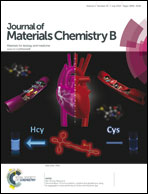Improving the oral delivery efficiency of anticancer drugs by chitosan coated polycaprolactone-grafted hyaluronic acid nanoparticles
Abstract
Sequentially overcoming the obstacles mainly from the low water solubility of lipophilic anticancer drugs, gastrointestinal microenvironment and systemic circulation is the major concern for designing oral anticancer drug carriers. Herein, we prepared the multifunctional polyelectrolyte complex nanoparticles (CNPs), engineered by hyaluronic acid (HA) grafted polycaprolactone (PCL) nanoparticles (HA-g-PCL NPs) coated with chitosan (CS) electrostatically, as a platform to improve the oral delivery efficiency of lipophilic anticancer drugs. Paclitaxel (PTX) and doxorubicin (DOX) were used as the model medicine and fluorescence probe, respectively. The size, zeta potential, morphology and pH-sensitivity of the NPs were studied systematically. The results indicated that the core–shell structure of CS/HA-g-PCL CNPs was formed at pH 5.0, which remained intact in the pH ranging from 3.0 to 6.8, while the CS layer detached gradually with the increase of pH to 7.4 and the HA-g-PCL NPs were released. In vitro drug release studies showed that accelerated drug release was triggered by hyaluronidase-1 (Hyal-1), which was a major HA degradation enzyme abundant within tumor cells. Cell uptake studies showed that HA-g-PCL NPs were internalized into cancer cells (EC109) via receptor-mediated endocytosis, but were rarely taken up by normal fibroblasts (NIH3T3). Furthermore, intracellular drug release indicated that HA-g-PCL NPs could provide an effective approach for transport of loaded cargoes into the cytoplasm. Therefore, higher cytotoxicity for PTX loaded HA-g-PCL NPs (HA-g-PCL/PTX NPs) against cancer cells EC109 but lower cytotoxicity against normal cells NIH3T3 was observed. In vivo studies showed that CS/HA-g-PCL CNPs via oral administration were able to preferentially deliver drugs into tumor tissue with commendable antitumor efficiency and few side effects. Overall, CS/HA-g-PCL CNPs showed great potential for improving oral delivery efficiency of lipophilic anticancer drugs.


 Please wait while we load your content...
Please wait while we load your content...